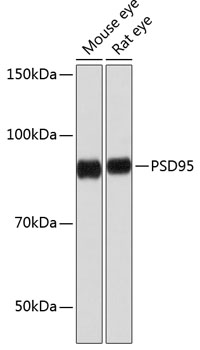Cell Biology Antibodies 16
Anti-PSD95 Antibody (CAB0131)
- SKU:
- CAB0131
- Product Type:
- Antibody
- Reactivity:
- Mouse
- Reactivity:
- Rat
- Host Species:
- Rabbit
- Isotype:
- IgG
- Antibody Type:
- Monoclonal Antibody
- Research Area:
- Cell Biology
Description
| Antibody Name: | Anti-PSD95 Antibody |
| Antibody SKU: | CAB0131 |
| Antibody Size: | 20uL, 50uL, 100uL |
| Application: | WB |
| Reactivity: | Mouse, Rat |
| Host Species: | Rabbit |
| Immunogen: | A synthesized peptide derived from human PSD95 |
| Application: | WB |
| Recommended Dilution: | WB 1:500 - 1:2000 |
| Reactivity: | Mouse, Rat |
| Positive Samples: | Mouse eye, Rat eye |
| Immunogen: | A synthesized peptide derived from human PSD95 |
| Purification Method: | Affinity purification |
| Storage Buffer: | Store at -20°C. Avoid freeze / thaw cycles. Buffer: PBS with 0.02% sodium azide, 0.05% BSA, 50% glycerol, pH7.3. |
| Isotype: | IgG |
| Sequence: | Email for sequence |
| Gene ID: | 1742 |
| Uniprot: | P78352 |
| Cellular Location: | |
| Calculated MW: | 90kDa |
| Observed MW: | 88KDa |
| Synonyms: | PSD95, SAP-90, SAP90 |
| Background: | This gene encodes a member of the membrane-associated guanylate kinase (MAGUK) family. It heteromultimerizes with another MAGUK protein, DLG2, and is recruited into NMDA receptor and potassium channel clusters. These two MAGUK proteins may interact at postsynaptic sites to form a multimeric scaffold for the clustering of receptors, ion channels, and associated signaling proteins. Multiple transcript variants encoding different isoforms have been found for this gene. [provided by RefSeq, Jul 2008] |
| UniProt Protein Function: | PSD-95: a membrane associated guanylate kinase (MAGUK) scaffolding protein located in neural postsynaptic densities. Associates with NMDA receptor NR2 subunits via glutamate serine (aspartate/glutamate) valine motifs in the cytoplasmic tail of NMDA receptor subunits and shaker-type potassium channels. Required for synaptic plasticity associated with NMDA receptor signaling. Its overexpression or depletion changes the ratio of excitatory to inhibitory synapses in hippocampal neurons. High levels in postsynaptic density of neurons in the forebrain. Also in presynaptic region of inhibitory synapses formed by cerebellar basket cells on axon hillocks of Purkinje cells. May reduce the amplitude of ACCN3 acid-evoked currents by retaining the channel intracellularly. Binds tissue-type plasminogen activator (tPA), mediating neural NMDA gating via a complex of LRP1, PSD-95 and NMDAR. Interacts through its first two PDZ domains with NMDAR2A, NMDAR2B, NMDAR2C, NMDAR2D, ACCN3, certain splice forms of NMDAR1, KV4.2, CXADR and synGAP. Interacts through its first two PDZ domains with Kv1.1, Kv1.2, Kv1.3, Kv1.4 and HER4. Interacts through its first PDZ domain with GluR6 and Kv1.4. Interacts through its second PDZ domain with the PDZ domain of nNOS or the C-terminus of NOS1AP. May interact with 5-HT(2A). Interacts through its third PDZ domain with NLGN1, and probably with NLGN2 and NLGN3. Interacts through its guanylate kinase-like domain with SAPAP1, SAPAP2, SAPAP3, SAPAP4, MAP1A, and BEGAIN. Interacts through its guanylate kinase-like domain with KIF13B. Two alternatively spliced human isoforms have been reported. Palmitoylation of isoform 1 is required for targeting to postsynaptic density. |
| UniProt Protein Details: | Protein type:Adaptor/scaffold Chromosomal Location of Human Ortholog: 17p13.1 Cellular Component: cortical cytoskeleton; dendrite cytoplasm; voltage-gated potassium channel complex; basolateral plasma membrane; endoplasmic reticulum; postsynaptic density; dendritic spine; excitatory synapse; postsynaptic membrane; synaptic vesicle; extrinsic to internal side of plasma membrane; cytoplasm; plasma membrane; ionotropic glutamate receptor complex; synapse; cell junction Molecular Function:P2Y1 nucleotide receptor binding; protein C-terminus binding; guanylate kinase activity; ionotropic glutamate receptor binding; protein binding; beta-1 adrenergic receptor binding; acetylcholine receptor binding; protein complex binding; D1 dopamine receptor binding; protein phosphatase binding; PDZ domain binding Biological Process: regulation of long-term neuronal synaptic plasticity; axon guidance; nervous system development; synaptic vesicle maturation; social behavior; learning; signal transduction; positive regulation of synaptic transmission; establishment and/or maintenance of epithelial cell polarity; synaptic transmission; elevation of cytosolic calcium ion concentration; establishment of protein localization; protein complex assembly; neuromuscular process controlling balance; nucleotide phosphorylation; negative regulation of receptor internalization |
| NCBI Summary: | This gene encodes a member of the membrane-associated guanylate kinase (MAGUK) family. It heteromultimerizes with another MAGUK protein, DLG2, and is recruited into NMDA receptor and potassium channel clusters. These two MAGUK proteins may interact at postsynaptic sites to form a multimeric scaffold for the clustering of receptors, ion channels, and associated signaling proteins. Multiple transcript variants encoding different isoforms have been found for this gene. [provided by RefSeq, Jul 2008] |
| UniProt Code: | P78352 |
| NCBI GenInfo Identifier: | 71658825 |
| NCBI Gene ID: | 1742 |
| NCBI Accession: | P78352.3 |
| UniProt Secondary Accession: | P78352,Q92941, Q9UKK8, B7Z1S1, G5E939, |
| UniProt Related Accession: | P78352 |
| Molecular Weight: | 80,125 Da |
| NCBI Full Name: | Disks large homolog 4 |
| NCBI Synonym Full Names: | discs, large homolog 4 (Drosophila) |
| NCBI Official Symbol: | DLG4 |
| NCBI Official Synonym Symbols: | PSD95; SAP90; SAP-90 |
| NCBI Protein Information: | disks large homolog 4; discs large homolog 4; Tax interaction protein 15; synapse-associated protein 90; postsynaptic density protein 95; post-synaptic density protein 95 |
| UniProt Protein Name: | Disks large homolog 4 |
| UniProt Synonym Protein Names: | Postsynaptic density protein 95; PSD-95; Synapse-associated protein 90; SAP-90; SAP90 |
| Protein Family: | Disks large |
| UniProt Gene Name: | DLG4 |
| UniProt Entry Name: | DLG4_HUMAN |







